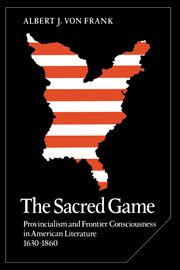Book contents
- Frontmatter
- Contents
- Dedication
- Preface
- Introduction: provincialism and the frontier
- 1 “But enmity this amity did break”
- 2 Brother Jonathan
- 3 “A musy in the thicket”
- 4 Geoffrey Crayon and the gigantic race
- 5 Hawthorne's provincial imagination
- 6 Working in Eden
- 7 Life as art in America
- 8 Reading God directly: the morbidity of culture
- Postscript: tradition and circumstance
- Notes
- Index
1 - “But enmity this amity did break”
Published online by Cambridge University Press: 07 October 2011
- Frontmatter
- Contents
- Dedication
- Preface
- Introduction: provincialism and the frontier
- 1 “But enmity this amity did break”
- 2 Brother Jonathan
- 3 “A musy in the thicket”
- 4 Geoffrey Crayon and the gigantic race
- 5 Hawthorne's provincial imagination
- 6 Working in Eden
- 7 Life as art in America
- 8 Reading God directly: the morbidity of culture
- Postscript: tradition and circumstance
- Notes
- Index
Summary
What could now sustaine them but the spirite of God and his grace? May not and ought not the children of these fathers rightly say: Our fathers were English men which came over this great ocean, and were ready to perish in this wildernes, but they cried unto the Lord, and he heard their voyce, and looked on their adversitie.
– William BradfordPermanent voluntary removal from a civilized to an uncivilized country has not been an experience of common occurrence in human history, yet it was one that Anne Bradstreet shared with all her neighbors. For her, though, even more than for most of the emigrants, it had been an especially traumatic experience, partly because as a woman she did not participate in the public achievements that sustained the men but also, and more decisively, because in England, at the earl of Lincoln's estate, she had grown up from girlhood accustomed to a life of intellectual activity and physical comfort such as she was unlikely ever to recover in her new surroundings. As the daughter of Thomas Dudley, the earl's highly regarded steward, she had lived well, had access to the library of Sempringham, heard music, engaged in stimulating conversation, attended church, seen the “riches of some famous Fair” – in short, she had lived the sort of pleasant and civilized life that, in later years in rude New England, would provide a fund of ideal memories.
- Type
- Chapter
- Information
- The Sacred GameProvincialism and Frontier Consciousness in American Literature, 1630–1860, pp. 11 - 26Publisher: Cambridge University PressPrint publication year: 1985

